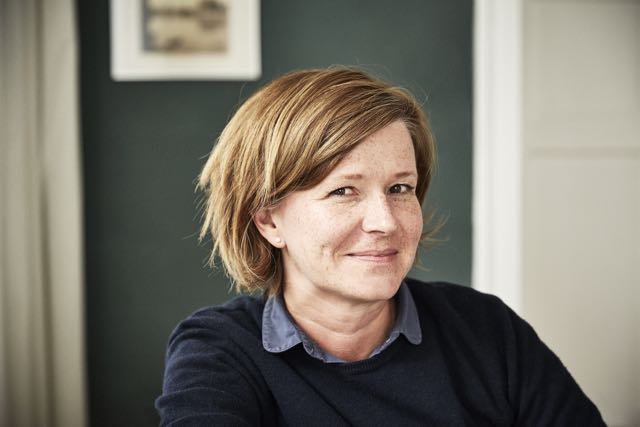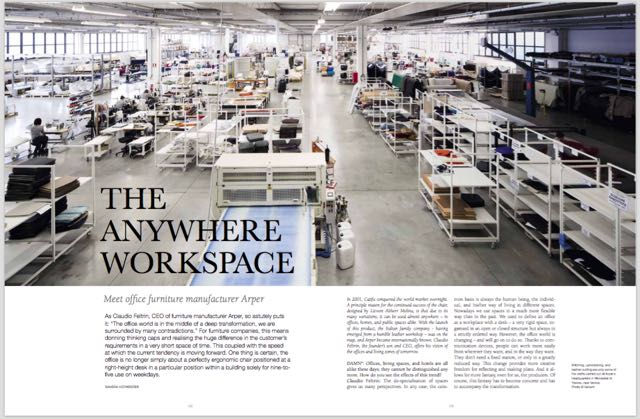In 2001, Catifa conquered the world market overnight. A principle reason for the continued success of the chair, designed by Lievore Altherr Molina, is that due to its many variations, it can be used almost anywhere – in offices, homes, and public spaces alike. With the launch of this product, the Italian family company - having emerged from a humble leather workshop – was on the map, and Arper became internationally known. Claudio Feltrin, the founder’s son and CEO, offers his vision of the offices and living zones of tomorrow.
DAMnº Offices, living spaces, and hotels are all alike these days; they cannot be distinguished any more. How do you see the effects of this trend?
Claudio Feltrin: The de-specialisation of spaces gives us many perspectives. In any case, the common basis is always the human being, the individual, and his/her way of living in different spaces. Nowadays we use spaces in a much more flexible way than in the past. We used to define an office as a workplace with a desk – a very rigid space, organised in an open or closed structure but always in a strictly ordered way. However, the office world is changing – and will go on to do so. Thanks to communication devices, people can work more easily from wherever they want, and in the way they want. They don’t need a fixed station, or only in a greatly reduced way. This change provides more creative freedom for reflecting and making plans. And it allows for more fantasy, even for us, the producers. Of course, this fantasy has to become concrete and has to accompany the transformation.
DAMnº What does this change mean for furniture?
CF: We don’t produce rigid products anymore, but instead, objects that are pleasing to use, no matter what the situation. I’m referring to functionality as well as to aesthetics, the values of communication, emotion, and motivation. If you feel good in the environment in which you work, which is perhaps not exactly a classical office space, you will forget about
the nasty side of the job and notice the nice aspect, which is the creativity. In my opinion, an environment must always stimulate its users.
DAMnº Ever since the beginning, you have created collections for the office that equally suit private houses and hotels. Where did the idea originate for an in-between universe?
CF: It was the company’s intuition and that of Alberto Lievore, with whom we have worked from the start. Together we have effected the desire to create something different, and to align the company with design. But I don’t mean design exclusively as a functional or superficial form. We also wanted it to possess meaning. So we analysed people’s everyday
needs and made up our mind with regard to how these needs will develop in future. Our idea was to improve the environments we live in. As we are furniture producers, we cannot intervene in the structure of a building, but we can propose furniture that creates an environment – and can thus improve the internal spaces. We wanted to develop our interpretation to enhance the daily work environment. With that as the backdrop, we gradually realised that our intentions were confirmed by the market. We had found the right way.
DAMnº Today, 15 years after the Catifa, you are launching an office chair for the very first time – Kinesit, designed by studio Lievore Altherr Molina. Will this be the beginning of a new specialisation?
CF: With Kinesit we simply wanted to solve the problem of the office chair – which will still be necessary – by bringing a new vision. Naturally, there will be fewer office chairs in future, but the ones that remain must have a holistic quality. The chair must be innovative in terms of function, but also as a whole, and it must be a pleasure to look at, even
though it is still an office chair. We wanted to add value to the market with an elegant chair that uses advanced technology without it showing. But we don’t intend to develop any other office-only systems. We work on subjects in a wider context. The product itself is not enough, you must think about a more complex world.
DAMnº Speaking of the future of offices, the big trend now is for co-working spaces containing different zones that are rentable for a certain period. What is your reaction to that?
CF: It is a development that allows us further possibilities. Every kind of schematisation pretends to help you because of its rules. But strict norms create many restrictions. At present, the office chair must have many clearly determined requirements. But as the office world is in the middle of a deep transformation, we are surrounded by many contradictions. One of them is that there are conventional rules for office chairs, and at the same time, people work while sitting on a pouf that does not at all respect those rules. Finally, we understand that the most important thing is to feel comfortable at work. People currently work everywhere, including at the airport or in the plane – they don’t care if they are sitting on a proper office chair. We want to create models for living coherently and to find honest answers through products, their quality, and their extended ergonomics that are no longer fixed to the angle of the seatback, but rather to the feeling of comfort, even in the aesthetical sense. I think this will be the
principal precept for the future. ‹
Text: Sandra Hofmeister

